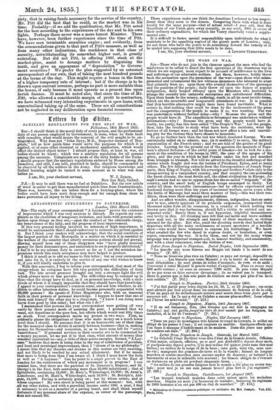ANTAGONISTIC INFLIIENCES TO PAUPERISM.
London, 19th March 1855. Sua—The reply of your correspondent "A Layman" proves the existence of impressions which I was very anxious to disturb. He regards my com- plaints as the ebullition of temporary irritation, and looks with genuine satis- faction upon things as they are,—upon the conduct of the admirable clergy, .the benevolence of the laity, and the progress oflocal improvement. If this very general feeling involved no interestwof, high importance, it would be unreasonable that I should endeavour to reiteratemy protest against it. But I think your readers will acknowledge, that the social condition. f the largest-portion of the Metropolis is a matter on which it is essential to -the welfare of the oountry that utterly erroneous notions should not prevail. -Having myself been one of those clergymen who "have gladly received money for their distressed poor, and undertaken to see it properly rlistributed," I feel it to be my solemn duty to correct so far as I can the mistaken im- pressions which this ready acceptance may have helped to produce. I think it needless to add-my name to this letter; but as your correspond- ent asks for it, it is entirely at the service of any one who wishes to know it, if you-will kindly Midertake to give it.
With this assurance, I beg to inform your correspondent, that most of the clergy-whom he eulogizes have 'felt very painfully the difficulties -of their task. The late severe _pressure 'brought out into a stronger light the evil which always more or less prevails. The difficulties may be summed up in this—that the clergy' have to deal, as if on personal knowledge, with a mul- titude of whom it is Simply impossible that they should have that knowledge. I appeal to your coirespondent's 'common sense, and ask him whether, in ad- - dila= to other laborious duties, he could become-personally acquainted with 20,-000 personw? He speaks of Police Magistrates also, with an innocent faith ip their powers of personal knowledge. I happen to know that one of them said himself the other day to a clergyman, "I know I am doing more harm than good by this relief ; but what can I do ?" - I maintained that persons like your correspondent were getting off very easily'y their present mode of assisting the poor. I protested that we
• want, not donations to the poor-box, but efforts which would cost fifty times as .much. Your correspondent meets my protest in two ways. First, he aridently places the obligations of those who make money on a much lower level than I should,. He assumes that it is an honourable use of their time for the moneyed class to divide-it entirely between business—that is, making money for themselves—and recreation, so as to have none left for "active benevolence." If personal services to their-country are to be commuted for emoney payment, let me pet it' to that class,' what amount df money they confider equivalent to—say, a tithed their active energies. Second, " A -Lay- -man " "believes that more IS being done in the way of subdivision of parishes, and local and municipal improvement, than I "dream of in my philosophy.' I-assure him that my theories and dreams in this matter are very exacting, and not likely to'be reached by any actual attainment. But if he means that more is being done than E am aware of, I think I must know the facts as well as "A Layman." Can he point to a single parish in the East of 'London for the subdivision of which any movement is in progress? I can remind him, that there are the parishes of St. Dunstan s, Stepney, and St. George's in the East, both containing more than 30,000 inhabitants ; that of 'Spitalfiekbi, containing 24,000 ; St. Mary's, Whitechapel, 18,000 ; St. Anna's, .Liatehouse, and St. Mark's, Whitechapel, each 16,000 ; St. Botolph's, Aid- -gate, 14,000. Paving is certainly going on ; but by whose orders, and at whose expense ? My own street is being paved at this moment : but, with -all my other duties, and with a parochial income under .1001. a year, I find it necessary to act as a member of a paving board, and shall think myself fortunate if my personal share of the expense, as owner of the parsonage, does not exceed 301. These experiences make one think the donations I referred to less magni- ficent than they seem to the donors. Comparing them with what is done locally for the same purpose—that of aetiml relief—I may add, that the Guardians of our lJniongave away reoently„ inane week, 500/. in excess of their ordinary expenditure, for which the Vestry cheerfully voted a supple- mental rate.
It is difficult to fasten special responsibility upon individuals for whati iaintain to be the appalling neglect of the poorer parte of London ; only, let not those who have the power to do something toward the remedy otit be misled into supposing thatlittle needs to be done.


























 Previous page
Previous page